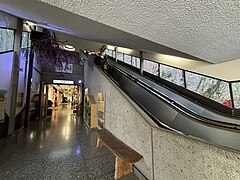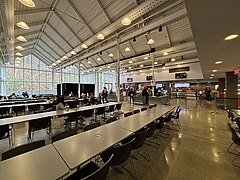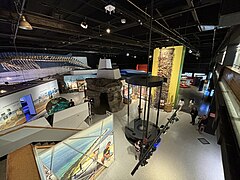Ontario Science Centre
The Ontario Science Centre (OSC; originally the Centennial Museum of Science and Technology) is a science museum organization based in Toronto, Ontario, Canada. Its original main location, which was permanently closed to the public on June 21, 2024, was located near the Don Valley Parkway about 11 kilometres (6.8 mi) northeast of downtown on Don Mills Road in the former city of North York. It was built down the side of a wooded ravine formed by one branch of the Don River located in Flemingdon Park.
Former name
Centennial Museum of Science and Technology
September 26, 1969
900,225[1]
Paul Kortenaar

 25 34 100 925
25 34 100 925 

 Science Centre (opening late 2024/early 2025)
Science Centre (opening late 2024/early 2025)

 Science Centre (opening 2030)
Science Centre (opening 2030)
Paid parking on site
On April 23, 2023, Premier of Ontario Doug Ford announced the Ontario government's general plan to replace the Ontario Science Centre with a smaller institution on the Toronto waterfront on the Ontario Place site, which is scheduled to open in 2028.[2][3] The proposal has aroused significant opposition.[2][3][4][5]
An engineering report[6] released on June 21, 2024 found that 2-6% of the roofs were at high risk of collapsing during the winter and recommended repairs, but did not recommend closing the building.[7] The same day, the Ford government announced that the site would be closed immediately and permanently, without attempting repairs due to the pending relocation. During construction of the new location, the centre will operate a temporary location and pop-up programming.[8] The decision to close the Don Mills site instead of repairing it was met with significant opposition.[9][7]
History[edit]
Construction and opening[edit]
Planning for the Science Centre started in 1961 during Toronto's massive expansion of the late 1950s and 1960s.[10] In August 1964, Premier of Ontario John Robarts announced the creation of the Centennial Centre of Science and Technology as a Centennial Project.[11] Toronto architect Raymond Moriyama was hired to design the site. Construction started in 1966 with plans to open the Centennial Centre of Science and Technology as part of the Canadian Centennial celebrations in 1967.[12]
However, construction was not completed in 1967, and the Science Centre did not open to the public until two years later, on September 26, 1969.[13] The official opening was held on the morning of September 27 and attended by VIPs, and was followed by opening to 30,000 invited guests in early afternoon.[11] It opened to the general public on September 28, drawing 9,000 visitors.[11] Its advertising slogan at launch was "Come see what would happen if Albert Einstein and Walt Disney had gotten together."[11]
The buildings and design were part of a broader change in Canadian architecture,[14] and remain an example of the brutalist style.[3]
When it first opened, the Science Centre was a pioneer for its hands-on approach to science, along with San Francisco's Exploratorium and the Michigan Science Center in Detroit. Unlike a traditional museum, where exhibits are for viewing only, the majority of the exhibits at the Science Centre were interactive, while many others were live demonstrations (e.g. metalworking). The Communications room contained a number of computerized displays, including a very popular tic-tac-toe game, run on a PDP-11 minicomputer.
By 1974, it hosted about 250,000 students on field trips annually.[15]: 82
Operations from 1990 to 2022[edit]
In 1990, the Ontario Science Centre announced a contract with Oman to design a children's museum. The Ontario Science Centre had agreed to boycott Israeli goods and services while under contract.[16] The Ontario Science Centre later amended the contract to specify that all goods sold to Oman would be produced in North America.[17] The centre's Director General Mark Abbott was later fired for knowingly signing the original contract.[18]
In 2001, the Centre embarked on a capital project called "Agents of Change", which focused on innovation and renewed about 85% of the Centre's public space, including the creation of seven new experience areas. The Centre received $47.5 million in contributions from the government of Ontario, private sector companies, and individuals. The Agents of Change transformation was completed 2007, culminating with the opening of the Weston Family Innovation Centre and the Teluscape plaza.[19]
In response to the COVID-19 pandemic in Ontario, the Science Centre received $500,000 from the Government of Canada to promote COVID-19 vaccine uptake among children and their families.[20]
Science School[edit]
The Ontario Science Centre Science School (OSCSS) offers grade 12 University Preparation courses in STEM subjects: physics, biology, chemistry, calculus, and advanced functions. All students also complete an interdisciplinary studies credit in science communication while enrolled with the OSCSS. The credits are issued by either the Toronto District School Board or the Toronto Catholic District School Board, which also fund the program so it is available at no cost to students from anywhere in Ontario. While at the Science Centre, students earn practicum hours through volunteering and interacting with visitors.[52]
Governance[edit]
As an Agency of the Government of Ontario, the Ontario Science Centre is overseen by Trustees appointed by the Lieutenant Governor in Council, who selects[53] not fewer than sixteen and not more than twenty-six trustees, and designates one of them as chair and another as vice-chair.[54] Meetings are held four times a year, and Trustees serve for a term not exceeding three years but may be reappointed for one or more terms.
Affiliations[edit]
The Ontario Science Centre is affiliated with the Canadian Museums Association (CMA), Canadian Heritage Information Network (CHIN), and Virtual Museum of Canada. The Ontario Science Centre is a member of the international Association of Science-Technology Centers (ASTC).
Cultural references[edit]
Ontario Science Centre was used by David Cronenberg as a location for his 1970 film Crimes of the Future.[55]
Media[edit]
Ontario Science Centre was featured on the Rick Mercer Report in 2016.[56] In his CBC news satire program, Rick Mercer visited numerous scientists' exhibits, took part in a wildlife conservation show, and partook in a psychological fear study during a workshop there.




![The Great Hall enclosed Cloud, a kinetic sculpture by David Rokeby; this installation has been removed.[citation needed]](http://upload.wikimedia.org/wikipedia/commons/thumb/c/c2/Ontario_Science_Centre_event_space.jpg/135px-Ontario_Science_Centre_event_space.jpg)



